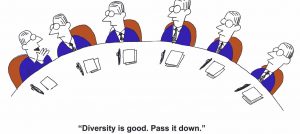
Photo Credit: http://www.quickbase.com/blog/6-ways-to-avoid-groupthink
To the extent that managers emphasize the importance of collaboration and teamwork, their decision outcomes seem to be inconsistent with that philosophy; that is, an inherent problem that faces teamwork in an organization is groupthink: a phenomenon in which there are group pressures for conformity, thus suppressing minority perspectives and resulting in a dysfunctional outcome. To many, this would seem to be paradoxical with the very essence of collaboration. This predicament bears the question: what strategies should organizations employ to overcome groupthink and empower all perspectives.
In classmate Ethan Tam’s blog, he assesses the comparative advantage teams gain from collaboration: “this statement does not imply that the results of a group is better than of an individual’s. It means that a group’s potential is always greater than one of a single person.” My discussion starts where his finishes; he acknowledges that teams have cutting edge due to their ability to empower a wide variety of perspectives and partake in integrative decision making – that is, in theory. Strategies managers could possibly adopt, in my opinion, to alleviate the inequities of groupthink would be to perhaps keep the group sizes small. For example, according to one source, smaller group sizes increase member confidence and provide more opportunities for feedback. Another possible solution, I think, would be to actively promote minority and dissenting perspectives. In this way, alternative solutions are articulated and increase the chances of reaching an equitable integrated decision.
In short, teamwork and collaboration are essential to increasing organizational productivity. As we have seen, groups have an inherent proclivity to suppress dissenting perspectives, ironically hindering the groups ultimate objectives. Managers and team members must be conscious of this problem and take into account possible remedies outlined above.
Words: 305
Bibliography
“5 benefits of learning in small groups.” Genie Tutors, Jan. 2016, www.genietutors.co.uk/5-benefits-of-learning-in-small-groups/.
Nancy Langton, Stephen P. Robbins, Timothy A. Judge, Robbins, S. P., & Judge, T. A. (2012, April 12). Organizational Behaviour – Concepts, Controversies, Applications.
Tam, Ethan. “OB POST 1: INDIVIDUALS VS A TEAM WHICH ONE IS BETTER?” UBC Blogs, Feb. 2017, blogs.ubc.ca/etam/.